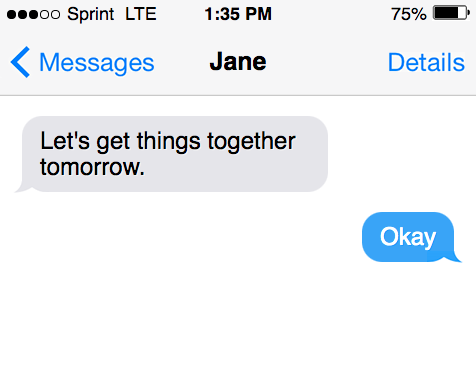Is it lets or let’s? Which is the correct spelling for the word lets? The English language can be complex and beautiful. It strings together like a symphony. Composing new meanings for relatively similar sounding words. And in its beauty, can be quite confusing, too.
Learn how to use “lets” or “let’s” in this short guide…
“Lets” and “let” definition
Merriam-Webster defines “let” as “to cause to.” “Lets” is the third person singular present tense form of the verb “let.” The word “lets” is a conjugation of the word verb “let.”
“Let’s” and “lets” are defined as the same thing. From the root word “let.” Meaning, to allow, suppose, or give permission to.

It is less common for “let” to get used in a noun form. For example, “the first tennis serve was a let.” It is far more common for the verb form of let to get used (where both “lets” and “let’s” get their use). For example, “It’s important for the market to let it set the price.”
Real estate form
Not to get confused with the verb form, “lets” can also get used when referring to real estate in Modern English. For example, “The property lets are available for sale.” Or “We need to obtain the lets for the rented property.”
Synonyms of let
Synonyms of “let” are:
- Allow
- Leave
- Permit
When to use “lets” without an apostrophe
When using “lets” without the apostrophe, a writer is referring to something in the third-person singular present tense form of “let.” It is used to define something as allowing or permitting.
Sentence examples
“The key lets you unlock all of the doors in the house.”
“Our application lets you meet others from your area in order to build a network.”

When to use “let’s” with an apostrophe
When using “let’s” with an apostrophe, you are using a contraction of the two words “let” and “us.” This is common when sentences are getting formed to describe two people deciding to do something together.
Both “lets” and “let’s” are based on the same verb of the word (or same root word) of “let.” To sound more formal in writing, someone could say, “let us” rather than “let’s.”
Sentence examples
“Let’s go to the park and have some fun today. Want to go play with me?”
“Let’s go to the store and get groceries so we can eat today. Want to go to the grocery store with me?”
What about “lets go” and “let’s go”
These phrases can be especially difficult in Modern English. Let’s go, and lets go. Both are common in conversation.
Regardless of the word “go,” both “lets” and “let’s” get used in the same way.
For example, “We want to go to the park today. Let’s go!” Or “The gymnast lets go of the balance beam and falls.”

Another example, “John lets go of all the stress from work and feels better.” Or “Let’s go on a hike before lunch this week.”
Both get used before prepositions. The words “of,” “to,” and “on” tend to get used after “go.” Although, do not make a significant difference in the way the words “lets” or “let’s” get used.
Lets vs. Let’s: key differences
The key difference between “let” and “let’s” is that the word “let’s” refers to something that two people are deciding to do together. It is saying, “let us.” At the same time, “lets” is permitting something in context.
For example, “The door lets the dog inside the house.” Or “Let’s go to dinner tonight and talk.”
- Let’s is a contraction of the verb “let” and the pronoun “us.”
- Lets is the third person singular present tense of the same verb, “let.”
When describing two people, the apostrophe in the word “let’s” is a substitute for the “U” letter in the word “us.” “Let’s” is more commonly used than the word “lets.” The American English vocabulary refers to two people being on the same page more than the word “lets” gets used to refer to permission or a property sense.

The definitions of the two words aren’t too dissimilar. Rather, they are both referring to an agreement. It is more common to write “let’s” than “lets” in American English. For example, “Let’s take a look at the writing.” Rather than the incorrect form, “Lets take a look at the writing.”
Sources
- Grammatical conjugation – Wikipedia
- Let Definition & Meaning – Merriam-Webster
- Difference between to let and to rent | STAR Translation
- Letting legal definition of letting
- Let’s vs. Lets – Dictionary.com
Inside this article
Fact checked:
Content is rigorously reviewed by a team of qualified and experienced fact checkers. Fact checkers review articles for factual accuracy, relevance, and timeliness. Learn more.
Core lessons
Glossary
- Abstract Noun
- Accusative Case
- Anecdote
- Antonym
- Active Sentence
- Adverb
- Adjective
- Allegory
- Alliteration
- Adjective Clause
- Adjective Phrase
- Ampersand
- Anastrophe
- Adverbial Clause
- Appositive Phrase
- Clause
- Compound Adjective
- Complex Sentence
- Compound Words
- Compound Predicate
- Common Noun
- Comparative Adjective
- Comparative and Superlative
- Compound Noun
- Compound Subject
- Compound Sentence
- Copular Verb
- Collective Noun
- Colloquialism
- Conciseness
- Consonance
- Conditional
- Concrete Noun
- Conjunction
- Conjugation
- Conditional Sentence
- Comma Splice
- Correlative Conjunction
- Coordinating Conjunction
- Coordinate Adjective
- Cumulative Adjective
- Dative Case
- Determiner
- Declarative Sentence
- Declarative Statement
- Direct Object Pronoun
- Direct Object
- Diction
- Diphthong
- Dangling Modifier
- Demonstrative Pronoun
- Demonstrative Adjective
- Direct Characterization
- Definite Article
- Doublespeak
- False Dilemma Fallacy
- Future Perfect Progressive
- Future Simple
- Future Perfect Continuous
- Future Perfect
- First Conditional
- Irregular Adjective
- Irregular Verb
- Imperative Sentence
- Indefinite Article
- Intransitive Verb
- Introductory Phrase
- Indefinite Pronoun
- Indirect Characterization
- Interrogative Sentence
- Intensive Pronoun
- Inanimate Object
- Indefinite Tense
- Infinitive Phrase
- Interjection
- Intensifier
- Infinitive
- Indicative Mood
- Participle
- Parallelism
- Prepositional Phrase
- Past Simple Tense
- Past Continuous Tense
- Past Perfect Tense
- Past Progressive Tense
- Present Simple Tense
- Present Perfect Tense
- Personal Pronoun
- Personification
- Persuasive Writing
- Parallel Structure
- Phrasal Verb
- Predicate Adjective
- Predicate Nominative
- Phonetic Language
- Plural Noun
- Punctuation
- Punctuation Marks
- Preposition
- Preposition of Place
- Parts of Speech
- Possessive Adjective
- Possessive Determiner
- Possessive Case
- Possessive Noun
- Proper Adjective
- Proper Noun
- Present Participle
- Prefix
- Predicate



